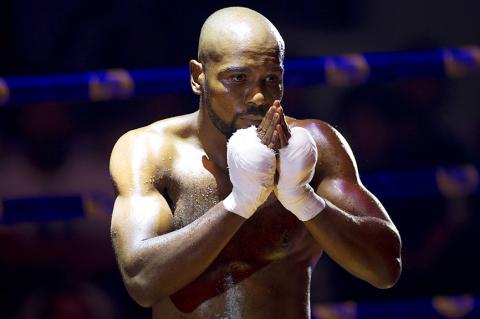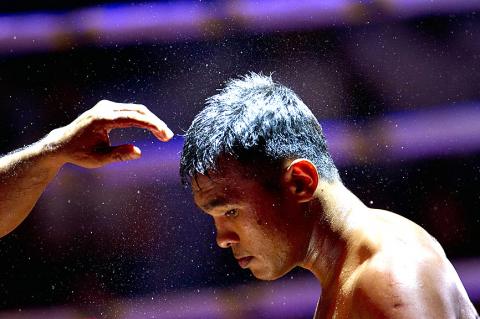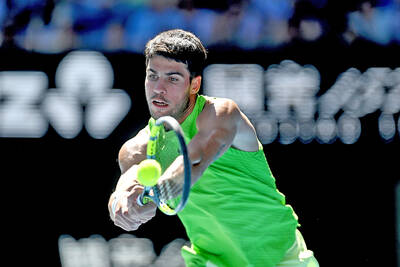A roar erupted at the Yangon ring as the home champion put a right hook into his American opponent’s face, crumpling him to the canvas in the opening round of the bone-crunching kickboxing bout.
However, for the American, and an increasing number of foreigners, the unvarnished brutality of the martial art lethwei is the reason they are seeking out Myanmar, primed for pain and ready to test their fighting skills.
With head-butts among the array of painful blows permitted, lethwei pugilists say their sport is the hardiest member of Southeast Asia’s kickboxing family — even more brutal than Thailand’s better known Muay Thai. Competitors have their hands wrapped, but do not wear gloves as they attempt to batter their opponent into submission. A win is by knockout only.

Photo: AFP
The American in the ring that night, Cyrus “Black Dynamite” Washington, is among several professional boxers joining the roster. He has competed several times in a nation where the sport is booming and the prize-pots are growing.
“Headbutts? Yeah it’s dangerous, but I think all ways of fights are dangerous,” the muscular 33-year-old told reporters, shortly before his match against the country’s top lethwei fighter, Tun Tun Min. “Headbutts, strong kicks and other physical attacks, all are dangerous in the ring.”
However, during Sunday’s fight, headbutts were the least of Washington’s concern.

Photo: AFP
He was felled a little over a minute into round one by a lightning-fast right hook from Tun Tun Min.
Washington knew exactly what faced him in the ring.
The Thailand-based Muay Thai specialist has traveled to Myanmar with increased frequency and had already met Tun Tun Min twice before, with both fighters notching up a victory apiece.
He has also had bouts against former national champion Saw Nga Mann and Too Too, another famous local fighter. Lethwei has a long history in Myanmar. Carvings on the temples of Bagan, which dot the central Myanmar plains, appear to show pairs of men locked in combat, suggesting the sport is more than 1,000 years old.
In modern times it was kept alive in the eastern border states of Karen and Mon, where kickboxing bouts are held to mark everything from monks’ funerals to New Year festivities.
Spectators in front-row seats are close enough to hear bones shatter and expect a sporadic showering of blood, sweat and spittle. It is not unusual to find boys as young as 10 taking part in matches.
If no one gets knocked out in five three-minute rounds, the match ends in a draw.
Until recently, it was rare for foreigners to fight in lethwei rings, but that is rapidly changing.
Zin Lin Htunn, a local lethwei expert, said the first outsiders began fighting in the mid-1990s, but were mainly from Thailand.
In more recent years, boxers from Japan, the US, the Philippines, New Zealand, Australia, Mexico and Costa Rica have followed in their footsteps, usually after training in Thailand. It is a trend that has been partially helped by the country’s political transformation from a junta-ruled autocracy into a quasi-democracy.
“They think this is one of the hardest martial arts and to win a Lethwei fight shows how strong they are,” Zin Lin Htunn told reporters.
Tun Tun Min’s year bears testimony to that changing demographic.
“I fought nine fights in this year and no opponents were from Myanmar,” he said. “All are from other countries.”
For local fighters like Tun Tun Min, who became the country’s lethwei champion last year, foreign fighters help increase the sport’s international recognition.
Born into poverty and the son of a lethwei boxer, when he first started out he made as little as 1,000 kyat (US$0.76) a fight.
“Now I earn as much as 6,500,000 kyats for a fight and this is the highest in Myanmar for a boxer,” he said.
He dreams of bringing his country’s style of fighting to the rest of the world. Yet, for now at least, lethwei still has a long way to go before it gains the kind of widespread recognition that Muay Thai has in Thailand.

The Philadelphia 76ers, fueled by 36 points from Tyrese Maxey and a triple-double from Joel Embiid, on Thursday beat the Houston Rockets 128-122 in an NBA overtime thriller. Cameroonian big man Embiid scored 32 points, grabbed 15 rebounds and handed out 10 assists, posting the ninth triple-double of his career to help the Sixers end the Rockets’ three-game winning streak. Rockets star Kevin Durant scored 36 points and Amen Thompson added 17, but Thompson was scoreless in the fourth quarter. Even so, the Rockets led by nine midway through the final frame, Maxey tying it at 115-115 with 40.1 seconds left. Durant missed a

The Milwaukee Bucks’ Giannis Antetokounmpo on Friday said that he will probably be out for an extended period after hurting his right calf again after a similar injury caused him to miss eight games earlier this season. Antetokounmpo had his right calf wrapped in the first half of their 102-100 loss to the Denver Nuggets. He did not appear comfortable the rest of the night and left for good with 34 seconds remaining. “At the end, I could not move no more, so I had to stop playing,” Antetokounmpo said. The two-time NBA Most Valuable Player said he expected to undergo an MRI

Luka Doncic on Monday produced a 46-point masterpiece as the Los Angeles Lakers snapped the Chicago Bulls’ four-game winning streak with a 129-118 victory on the road. Doncic rattled in eight three-pointers on 15-of-25 shooting from the field, finishing with seven rebounds and 11 assists to lead an impressive Lakers effort at the United Center. LeBron James chipped in with 24 points, five rebounds and three assists, while Rui Hachimura delivered an eye-catching cameo off the bench with 23 points from nine-of-11 shooting. The win was another encouraging result for the Lakers after a 116-110 defeat of the Dallas Mavericks on Saturday. “We did

Taiwanese FORTUNES: Wu Fang-hsien and Hsieh Su-wei both advanced to the last 16 of the women’s doubles, but Ray Ho was ousted in the men’s doubles Carlos Alcaraz yesterday stepped up his quest to win a maiden Australian Open as he overwhelmed showman Corentin Moutet to reach the last 16, while Taiwan’s Wu Fang-hsien and Hsieh Su-wei both advanced to the last 16 of the women’s doubles. Three-time finalist Daniil Medvedev battled through on day six at a warm and sunny Melbourne Park, as did Coco Gauff. Top seed Alcaraz was never in danger against French 32nd seed Moutet, easing through 6-2, 6-4, 6-1 at Rod Laver Arena in 2 hours, 5 minutes. It was the Spaniard’s 100th Grand Slam match and he boasts a remarkable 87-13 win-loss record,